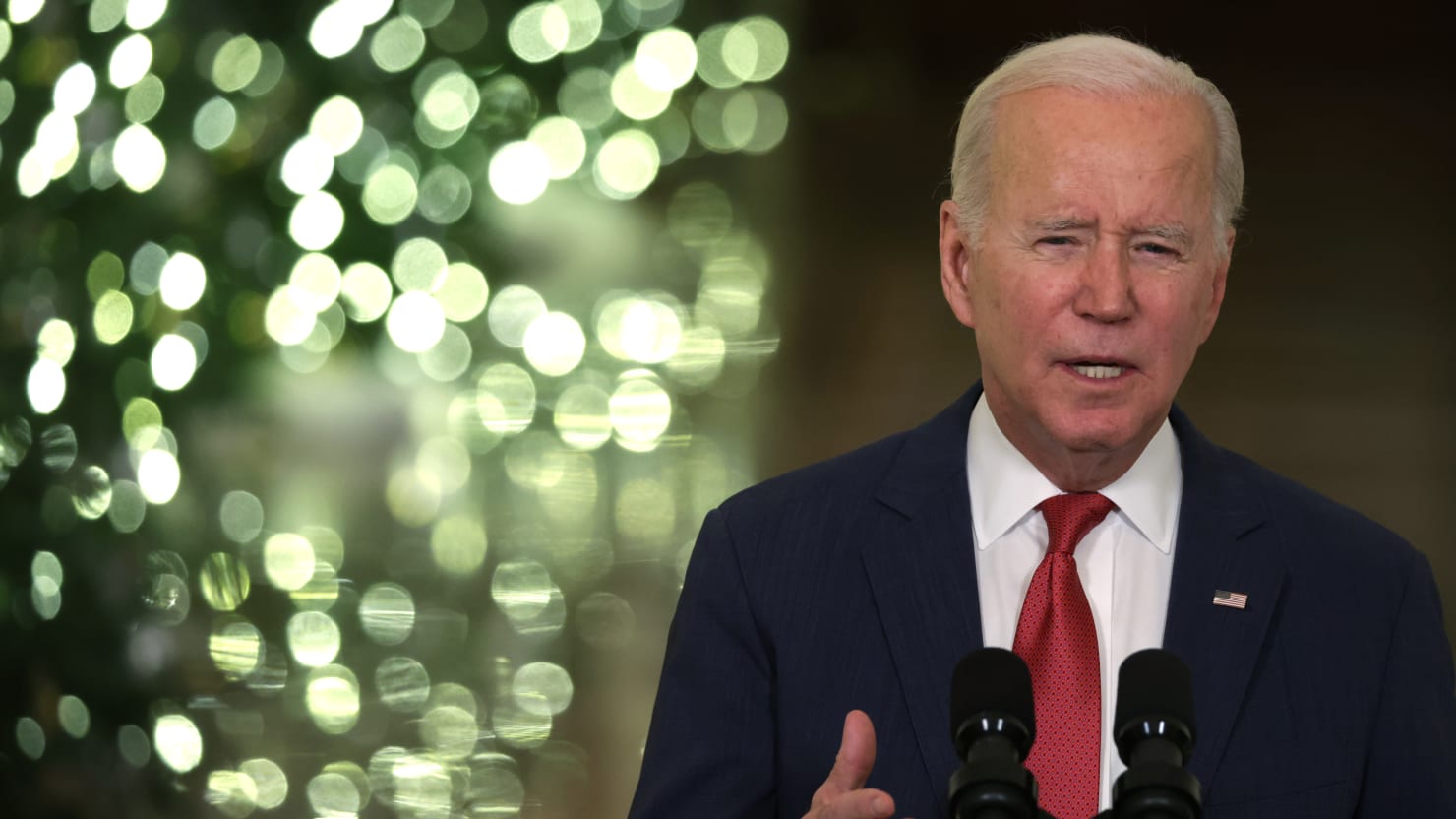In the final act of the Democratic Party’s unified control of Washington, President Joe Biden is set to sign a $1.7 trillion spending bill next week, funding the federal government through most of next year and marking the end of a historically productive Congress for Democrats.
After the Senate passed the “omnibus” spending bill Thursday night by a bipartisan 68-29 margin, the House passed the bill on Friday along far more partisan lines, 225-20. Just nine Republicans voted for the legislation, many of them retiring members taking their last votes. One Democrat voted no and one voted present—Alexandria Ocasio-Cortez (D-NY) and Rashida Tlaib (D-MI), respectively.
Biden signed a one-week continuing resolution into law on Friday, allowing congressional staff to take their time engrossing the massive omnibus legislation and prepare for a formal bill signing ceremony.
The 4,155-page bill is a sweeping measure that provides $772.5 billion for domestic priorities and $858 billion for defense. Additionally, the bill provides $45 billion for military aid to Ukraine, nearly $40 billion for disaster relief, and includes a number of policies that hitched a ride on the year-end spending legislation. Most notably, lawmakers included new safeguards for the counting of electoral votes, a proposal from Sen. Josh Hawley (R-MO) to ban TikTok on government phones, and guidance on selecting a site for a new FBI headquarters in either Virginia or Maryland.
While 18 Republicans in the Senate voted for the bipartisan legislation, including Minority Leader Mitch McConnell (R-KY), the House proved to be a different story.
The current House Minority Leader who is fighting to become Speaker next year, Rep. Kevin McCarthy (R-CA), delivered a rambling 25-minute speech against the legislation on Friday, calling the bill “a monstrosity” and “one of the most shameful acts I’ve ever seen in his body.”
“The appropriations process has failed the American public, and there’s no greater example of the nail in the coffin of the greatest failure of a one-party rule of the House, the Senate and the presidency,” McCarthy said.
After he finished his speech about the indignity of funding the government, Rules Chairman Jim McGovern (D-MA) had a simple response on the House floor: “After listening to that, it’s clear he doesn’t have the votes yet.”
McCarthy has been trying to gather the support of the most conservative elements of his party for his speakership bid, and his disappointment in a legislative product that Republicans had a guiding hand in writing is likely, at least partially, motivated in showing his right-wing detractors that he takes their spending and procedural concerns seriously.
Still, the omnibus will almost certainly be the final bill passed under Speaker Nancy Pelosi’s control of the House, and it is a classic representation of how Pelosi ran the House during her second speakership. There hasn’t been a single open rule since Pelosi took the Speaker’s gavel in 2019, meaning members haven’t been able to get votes on amendments to legislation without Pelosi and the Rules Committee’s sign-off.
And as McCarthy correctly noted Friday, no lawmaker would have had the ability to read the massive spending bill—the text was only released on Monday. A majority of the members who voted on Friday—226 of them, or more than half of the chamber’s membership—also voted by proxy, meaning they were not present in the Capitol.
Whoever takes the Speaker’s gavel next January is likely to end the controversial proxy voting process, which was established shortly after the COVID-19 pandemic emerged in 2020. And many lawmakers believe the process for getting votes on amendments will be more open under a new speaker.
But there’s no denying the effectiveness of Pelosi and the Democratic Party’s tactics. Not only did Democrats finish off their unified control of Congress with a spending bill chock full of their wishlist items, they also were able to pass some major legislative accomplishments during Biden’s first two years in Congress.
Among the long list of achievements are a number of priorities that had evaded lawmakers for years—sometimes decades. Democrats passed and signed into law a $1.2 trillion infrastructure bill, a $433 billion bill tackling climate change and lowering the cost of prescription drugs, a $1.9 trillion COVID-relief bill, the most significant gun safety reform bill in nearly 30 years, an overhaul of the U.S. Postal Service, a health care expansion for veterans, and a number of bills supporting Ukraine that have come with the added benefit of substantially weakening the Russian military.
When the book is written on the 117th Congress and Biden’s first two years in office, historians will have to note the historic achievements Democrats were able to push through—most of the time with notable help from some Republicans. In the Senate, GOP members, sometimes McConnell himself, were instrumental in the passage of gun reforms and the infrastructure bill, not to mention legislation codifying same-sex marriage.
But now, with a GOP majority set to take over the House, that bipartisan legislative productivity is likely to come to an end, replaced with partisan investigations and a split House and Senate that will be at odds with each other over most things. As the omnibus spending bill showed, there is also a real schism between the Senate GOP—where many members backed the legislation—and the House GOP, some of whom called their Senate colleagues “traitors” for doing so.
As Pelosi made what she said would likely be her last floor speech as speaker, she noted that it was “sad to hear the Minority Leader say that this legislation is ‘the most shameful thing’ to be seen on the House floor in this Congress.”
“I can’t help but wonder: Had he forgotten January 6th?” she asked.



